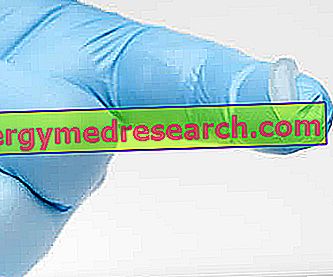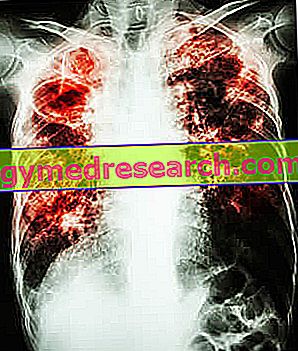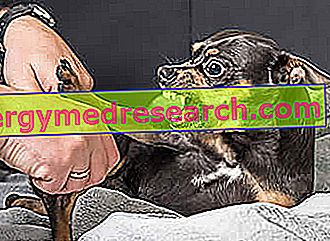Anal burning is a symptom that may indicate a simple irritation or an inflammatory pathology of the mucosa that covers the anal sphincter.

The mechanism that triggers anal burning is fundamentally irritative and inflammatory.
As we shall see, the causes can be of various kinds.
What to do
- In case of persistent and unknown anal burning, it is necessary to understand the underlying cause. Some reasons for anal burning are:
- Infection (such as candidiasis, gonorrhea, oxyuriasis etc.).
- Irritative contact dermatitis (for example diaper rashes, excessive cleansing, etc.)
- Allergic dermatitis (for example, towards laundry materials or the ingredients of intimate hygiene products).
- Inflammed hemorrhoids.
- Fistulas.
- Fissures.
- Anal sex.
- Constipation or diarrhea.
- Poor intimate hygiene.
- Power supply (see below).
- Hormonal disorders (especially of the thyroid)
- Psychic stress.
- If it is not possible to independently recognize the underlying cause, contact your doctor. He will carry out a superficial analysis or prescribe a specialist dermatological or proctological examination.
- However, if the burning is not so annoying as to be incapacitating and is not accompanied by pain, bleeding or itching, there are good chances to solve it respecting some precautions:
- Treating intimate hygiene.
- In the case of frequent public toilets (without a bidet or shower), it is necessary to have wet detergent wipes.
- Prefer materials and products that do not cause irritative dermatitis.
- In case of allergy, use only materials or products normally tolerated.
- Follow a diet devoid of irritating or food intolerant molecules, and rich in beneficial elements for the intestinal mucosa.
- Prevent or treat bowel disorders (constipation and diarrhea) with diet, medications and natural remedies.
- Practice anal sex in conditions of maximum hygiene and lubrication.
- Prevent or cure any pathologies of the anus (inflamed haemorrhoids, fissures and fistulas) with diet, drugs, natural remedies or surgery.
- Preventing or treating any infectious diseases of the anus using precautions or drug therapies.
- Compensate for any hormonal disorders.
- Reduce psychological stress.
What NOT to do
- Ignore the burning in the early stages, favoring the worsening of the symptom.
- If persistent or worsening, do not consult a general practitioner or, better, a specialist.
- Have poor intimate hygiene.
- Use materials and products that can cause irritative dermatitis (perfumes or deodorants, laundry, detergents, absorbents, etc.).
- Use materials and products that can cause allergic dermatitis (laundry, detergents, absorbents, etc.).
- Follow a diet rich in irritating molecules, subject to food intolerance and / or lack of beneficial nutrients for the intestinal mucosa.
- Neglect constipation or diarrhea.
- Practice anal sex in poor hygiene conditions and without lubricants.
- Neglecting diseases of the anus (inflamed hemorrhoids, fissures and fistulas).
- Neglecting infectious diseases of the anus.
- Do not compensate for any hormonal disorders.
- Giving in to psychological stress.
What to eat
Dietary advice for preventing and treating anal burning involves - depending on the causes - the compensation for: constipation, diarrhea, hemorrhoids, fissures and chemical irritations.
- For constipation, fissures and hemorrhoids :
- Foods rich in fiber. The soluble ones are more recommended, but usually the foods contain both. Furthermore, the percentage of insoluble ones is generally higher. The fibers also act as a prebiotic:
- Cereals: the whole grains are preferred. The fibrous portion of these foods is above all insoluble, but it is advisable to include them in the diet.
- Leguminous: those with a peel should be preferred. Many think that the side effect of legume intake, or flatulence, derives mainly from the fibrous component; It is not so. This is the effect of certain anti-nutritional molecules that remain in excessive quantities in undercooked vegetables. NB . Soaking dry ones (eliminating water) is a factor that helps their expulsion.
- Vegetables and fruits: these are foods that contain more soluble fiber
- Oilseeds: the so-called dried fruit is very rich in fiber; however, oilseeds are also high in fat and can have an excessive caloric impact. In the daily diet should be placed in the amount of a few grams.
- Algae: they are a predominantly oriental food which, however, has numerous positive characteristics; among these, the richness in soluble fibers.
- Guaranteeing the supply of fats: 25-30% of the energy in fats favors the lubrication of the feces and the consequent slipping in the intestine. It is advisable to prefer:
- Vegetable oils, preferably cold pressed: they soften the stools, are liquid at room temperature and provide many healthy nutrients.
- Eating heavily hydrated foods: as anticipated, the cause of fecal hardening is dehydration. Water rich foods and recipes are recommended, such as:
- Fresh and raw foods: especially fruits and vegetables.
- Soups in broth.
- Cereal soups or legumes in broth.
- Milk and yogurt.
- Fish and meat soups.
- Drink plenty of water, both between meals and with meals.
- Insert probiotic foods: they enrich the intestinal bacterial flora and can improve the health of the intestine: yogurt, buttermilk, kefir, tofu, tempeh, miso, kombucha, sauerkraut, gherkins etc. on the other hand, it must be remembered that the acidic barrier of the stomach eliminates most of the microorganisms.
- Laxative foods: this category is generic and contains all the products capable of exerting a laxative effect. They are laxatives: rehydrated prunes (also drinking the soaking water), milk (especially hot), yogurt, broth, honey, beer (especially raw), blackberries, grapes, peaches, licorice, figs, kiwi, sugali etc.
- For diarrhea :
- Astringent foods include: lemon, unripe bananas, medlar, carob flour and tea.
- Foods that do not contain fiber: those of the I and II basic food group. Among these, the most suitable are: lean meat and fishery products, poor in connective tissue (poultry, rabbit, fillet and loin of larger animals, sea bream, sea bass, cod, prawns, etc.), very mature and non-fat cheeses (especially grana padano and parmigiano reggiano).
- If necessary (based on the etiology of diarrhea) also insert probiotic foods, avoiding those rich in lactose.
- See also: Diet for Diarrhea
What NOT to Eat
- For intolerances:
- In case of lactose intolerance, eliminate:
- Milk and derivatives, especially fresh, unfermented ones.
- In the case of celiac disease, remove the following cereals and derivatives: wheat, spelled, barley, spelled, sorghum, oats, rye.
- For constipation, fissures and hemorrhoids, it is inadvisable:
- follow hypolipid diets, ie with a quantity of fat lower than 25% of the energy.
- Eat dehydrated foods:
- Cheeses and cured meats.
- Dried meat and fish.
- Meat and fish in salt or in oil.
- Condensed milk.
- Dehydrated dehydrated fruit, concentrated, cooked and squeezed vegetables (such as spinach) etc.
- Crackers, breadsticks, croutons etc. instead of fresh bread.
- Dry snacks (fried corn, peanuts, nachos, etc.).
- Astringent foods: the astringent action has a rather subjective effect. Some are: tea, lemon juice, banana, boiled white rice, carob and flour etc.
- Diuretic supplements.
- For diarrhea:
- Milk and dairy products (mozzarella, certosa, ricotta, etc.).
- Laxative foods: because they are rich in fiber or other laxative or prebiotic molecules. Whole grains, non-peeled legumes, honey, kiwi, milk (especially hot), broth, tamarind, cassia, dried fruit, figs, licorice, oilseeds, bran, beer etc.
- If necessary, probiotic foods (depending on the etiology of diarrhea).
- Foods that are very fatty, too protein-rich or rich in connective tissue: salty and sweet snacks, creamy desserts, cuts of fatty meat (ribs, bacon), sausages and cold cuts (sausages, mortadella, etc.), fatty cheeses (eg mascarpone, burrata) etc.), molluscs, certain offal, etc.
- Foods with irritating molecules: chilli, pepper, horseradish, ginger, onion, garlic, coffee, cola, chocolate, cocoa and alcohol.
Natural Cures and Remedies
- Specific natural remedies against alveolar disorders (laxative plants for constipation and astringents for diarrhea).
- For hemorrhoids: decoction creams or compresses with active principles with a protective capillarotropic action (based on Centella, Rusco, etc.).
- For fissures: decoction creams or compresses with active anti-inflammatory and healing ingredients (based on Mallow, Plantain, Altea, etc.).
- For infections: creams or compresses containing anti-fungal and antibacterial phytotherapeutic elements (these properties boast above all some essential oils).
- Remedies for idiopathic burning: the essential oils of mint and eucalyptus, appropriately diluted, are very useful for symptom reduction
Pharmacological care
- For constipation, fissures and hemorrhoids :
- All laxatives that do NOT have an irritative action against the intestinal mucosa.
- Lactic ferments and probiotics: reconstitute the intestinal physiological barrier, in turn responsible for the fight against pathogenic bacteria in the intestine.
- For diarrhea :
- Sometimes lactic acid bacteria and probiotics can be useful.
- Antibiotics specific for infectious dysenteries: the broad spectrum ones are not suitable, as they also damage the intestinal bacterial flora. There is a specific category necessary for the treatment of dysentery.
- Antiprotozoans: against protozoan infestations.
- Spasmolytics: they do not affect the infection but reduce the symptoms; they are also widely used for other forms of diarrhea.
- Vegetable charcoal: absorbs gases and partly excess fluids in the intestine.
- Anxiolytics: they work in cases of psychosomatic diarrhea.
- For hemorrhoids : especially anti-inflammatory drugs (eg Cortisonics) and local anesthetics (for example Lidocaine).
- For fissures : especially anesthetic drugs (for example Lidocaine) and muscle relaxants (for example Nifedipine).
WARNING! It is very important not to reverse the specific therapy for hemorrhoids with that for rhagades or vice versa; you could get the opposite effect.
- For infections of the anus (fungal and bacterial), specific drugs and especially topical ointment (for example Nistatin or Cancidas for candida). Systemic drugs are more suitable for parasitoses.
- For the idiopathic burning, analgesic and general anti-inflammatory drugs are used for topical use (especially ointments):
- Corticosteroids for topical application: Hydrocortisone (eg Locoidon).
- Local anesthetics: Lidocaine (vagisil), Pramoxina (eg Proctofoam HC) or Benzocaine (eg Foille pomata).
- Antihistamines such as: are used for the burning of allergic dermatitis
- Diphenhydramine (eg Aliserin, Difeni C FN).
- Hydroxyzine (eg Atarax).
- For hormonal disorders, dedicated drugs exist. For example, in case of thyroid decompensation, levothyroxine sodium therapy (eg Eutirox) is frequent.
- For excessive psychological stress, some people choose to use small doses of anxiolytics like benzodiazepines.
Prevention
- Prevention of anal burning is linked to the specific cause. In principle it is advisable:
- Avoid infections and parasites.
- Prevent allergic, contact, abrasive dermatitis, etc.
- Eliminate foods that can trigger a reaction of food intolerance and irritating ones.
- Follow a diet against disorders of the beak and / or against hemorrhoids or fissures.
- Practice anal sex with the necessary precautions (lubricants, intimate hygiene, etc.).
- Respect specific drug therapy in case of hormonal disorders, infections, etc.
- Prevent nervous stress.
Medical Treatments
There are no medical treatments aimed only at anal burning.
However, some proctological surgical procedures aimed at treating any primary pathologies (elimination of fistulas, haemorrhoids and fissures) can definitively alleviate the burning of the anus.



